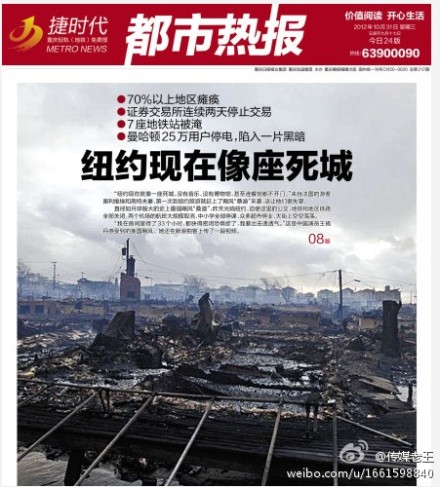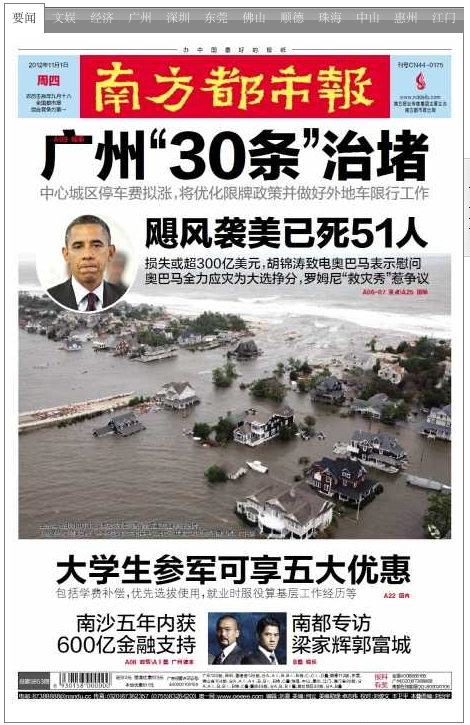Chinese media have been blanketed this week with coverage of Hurricane Sandy, the storm that battered the mid-Atlantic region of the United States on October 29 and 30. Since October 30, 1,290 articles on Hurricane Sandy have appeared in mainland media. That includes 709 newspaper stories, 171 wire stories and 410 web stories [Source: WiseNews].
Coverage of the hurricane in China has prompted some discussion of how, whether and why Chinese media should cover a storm on the other side of the world. Has reporting focused too much on America’s woes and sensationalized the story? How much reporting should there be? Does the story need to be told at all?
For a quick taste of Chinese coverage, here is an example on the more sensational end of the spectrum. This is the Metro News, a free publication launched in December 2011 and distributed on the subway in the city of Chongqing. The headline on its front page yesterday read: “Right Now New York Looks Like a Necropolis.”

[ABOVE: The November 1, 2012, edition of Chongqing’s Metro News strikes a macabre tone in its coverage of Hurricane Sandy.]
Guangzhou’s Southern Metropolis Daily led with a jarring image of a flooded residential area and the popping headline: “51 Already Dead in [Wake of] Hurricane Sandy.” The smaller headline conveys other information, such as the estimated 30 billion dollars in damage.

[ABOVE: The November 1, 2012, edition of Guangzhou’s Southern Metropolis Daily leads with the number of reported dead in its front-page coverage of Hurricane Sandy.]
In yesterday’s edition of the Chinese-language Global Times, He Hui (何辉), head of the Public Relations and Public Opinion Institute of the Communication University of China, writes that, yes, Hurricane Sandy is an important story for Chinese media.
He’s discussion turns quickly to the issue of the international “going out” of Chinese media, which has been a strategic priority for the Chinese Communist Party since October 2007, when President Hu Jintao said in his political report to the 17th National Congress that China needed to enhance its “soft power.” Hu Jintao further elaborated these ideas in a speech during a visit to the official People’s Daily in June 2008.
The Global Times editorial makes a rather typical, out-of-the-box Party argument (in line with the CCP “soft power” mainstream) that Chinese media should try to accommodate the demands of foreign audiences in order to expand their reach while at the same time maintaining “a Chinese position.”
This, in my view, is the greatest internal contradiction in China’s “soft power” push. The need to break out of the box but remain obediently inside it. To have one’s own views, so long as they are in harmony with those of the Chinese state.
Reading He Hui’s remarks about the strengths of the Economist as a publication, one has to wonder whether he — and indeed, many Chinese communications scholars — actually understand what makes this and other “first-rate international media” tick. Certainly, the Economist has a strong and unmistakable psychographic [READ THIS]. It has a “decidedly singular worldview.” But it is most definitely not held back by state agendas or ideologies.
But anyhow, here we go.
“On Hurricane Reports, Chinese Media Should Compete with Overseas Media“
By He Hui (何辉)
November 1, 2012
Global Times
Hurricane “Sandy” has recently caused heavy damage in the eastern United States. Concerning the impact of this hurricane, Chinese media have done heavy and dense reporting. Some have pointed fingers, asking whether Chinese media have gone overboard in their response to hurricane Sandy. Most of these doubts and concerns are well-intentioned. To answer them, we must understand how the “going out” of Chinese media should go forward, and how it can best be adapted to and accepted by audiences at home and abroad.
For Chinese media there is a real need for reporting on hurricane Sandy. This is not as some have suggested a case of China intentionally exposing America’s problems and dramatizing its woes, because from the perspective of the media all major events should get attention. Aside from issues of politics, economics and military affairs, natural disasters are also often the focus of world media attention. Because emergency situations often profoundly influence people’s lives and work, and they touch on life and death and the deepest human emotions. This means that in the case of relatively large-scale emergencies, not only local media but also non-local media will often report actively on them. This could be seen in domestic and international reporting in the case of the Asian tsunami, the earthquake in Japan and the Sichuan earthquake.
This storm striking America’s east coast caused the cancellation of many international flights, massive transportation paralysis, fires in Manhattan, two days of suspended trading on the New York Stock Exchange, and a large number of deaths. Owing to the important political and economic position of the United States in the world, this disaster not only influences the lives of Americans but touches other regions of the world as well. In “going out” and expanding their international influence, Chinese media need to not only to keep up with reporting of this kind of major story, but they need as much as possible to be faster, fresher and more insightful than other mainstream media in reporting on this event.
In recent years, Chinese media have gradually moved out into the world. In this process, we cannot simply report on China’s bright spots, nor can we simply choose the worst things in foreign countries to report about. The key to the success of reports does not lie in the news per se, but rather in whether or not they offer clear insight to the audience.
Moreover, if Chinese media wish to earn international prestige, they must respond on the one hand to the varying demands different audiences around the world have toward information, and on the other hand must maintain a Chinese position. Right now there is one view that holds that in order to attain to the level of international media [we] must set aside our own position. In fact, this is a conceptual error. Britain’s Economist magazine is without a doubt a mainstream publication with international prestige. But while its position on a number of issues still invites controversy internationally, this does not damage its standing as a media of international standards. Why? Because it has long maintained a wide vision, and it steadily offers an insightful perspective on political, economic, cultural and technological issues. Even as it maintains its own position, it does not oppose serious thought and discussion.
As they move out into the world, Chinese media need to study the broad visions and persevering insight of first-rate international media.




















